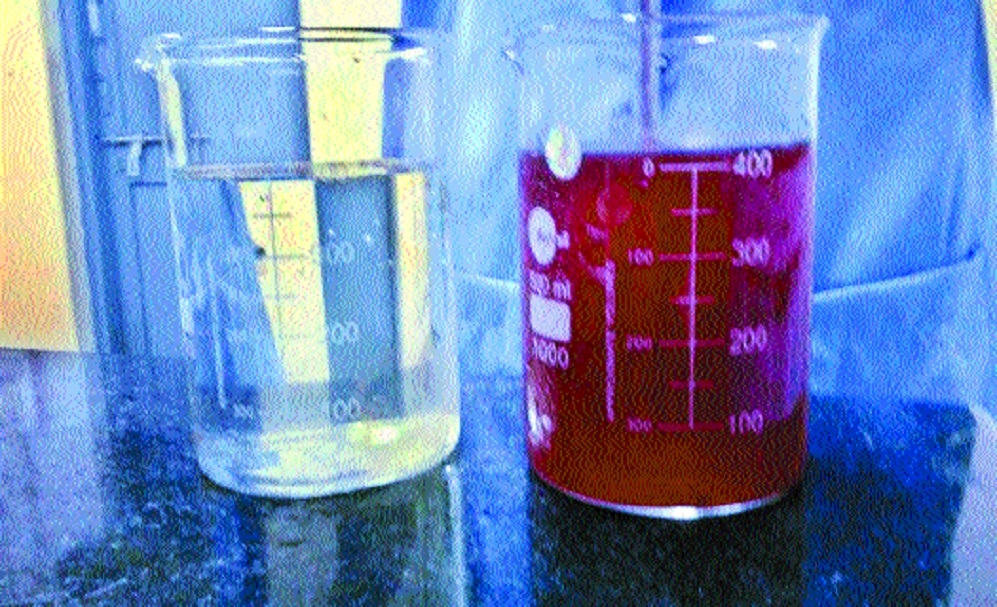NEERI develops system to treat biomedical liquid waste
| Date :14-Jun-2019 |

Operation theatre effluent (R) and quality of treated effluent after treatment.
By Ramesh Marulkar:
CSIR-NEERI has successfully developed a treatment system for biomedical liquid and pathological effluents on pilot scale based on the analysis and engineering. The system is developed in order to overcome the health hazards created by disposing off blood, water, body fluid and pathological samples into drain without treatment by 96% hospitals in country. At present, biomedical liquid waste (BMLW) is generally disposed off into sewer lines or drainage without any prior treatment, which ultimately finds its way to centralised sewage treatment facility or to surface water bodies. The basic need for biomedical liquid waste management comes from the fact that: Let the waste of the “sick” not contaminate the lives of the “healthy”.
The approach developed by CSIR-NEERI for BMLW treatment involves biological means of removal of organic matter and disinfection using cleaner technologies. An integrated approach referred to as multi-intervention system shall be demonstrated to treat the BMLW effluent that does not involve use of chemicals and thus minimises recurring costs and offers ease of operation.
This was disclosed by Dr M P Patil, Chief Scientist, NEERI (Wastewater Tech), Nagpur, and Dr Girish Pophali, Principal Scientist, while talking to ‘The Hitavada’ on Thursday. They said, releasing of such waste into drainage can create contamination and infection, causing health problems to the people. NEERI scientists worked in the project laboratory on large-scale findings are to be implemented on lab to field basis, they added. As per the norms by Maharashtra Pollution Control Board, such waste liquid needs to be treated, disinfected and then released to outlets. A hospital will be required to collect such waste water at a certain place for treatment purpose.
Dr Patil pointed out that many hospitals made two per cent chlorination and then release such waste water. This does not help remove organic matter, he said adding that treatment was not being done in 96 per cent hospitals in the country. Dr Pophali, who actually worked on the project, said that the Department of Science & Technology, Central Government, had asked for a concept note on the issue and accordingly NEERI submitted it and made presentation. The department asked for concentrating on the work on large-scale and it would provide funds for demonstration purpose so that hospitals could replicate. The GMCH authorities have shown willingness to implement this biomedical liquid waste treatment and management system. After the treatment and disinfection reddish water from an operation theatre turned to be colourless water. Safe and effective management of biomedical liquid waste was still in its early stages all over the world, Dr Pophali added.
According to the World Health Organisation (1999, 2014), India contributes 25 to 30% of the global injections and annual injection usage in India is of the order to 3 - 6 billion of which nearly two-thirds (62 per cent injections) are unsafe. An any given time, 1.4 million people worldwide suffer from Health Care Association Infections (HCAI), and at least 50 per cent of HCAI are preventable, Pophali added. The major deliverables of the project are: Demonstration of a techno-techonomic and environmentally sustainable treatment process for management of biomedical liquid waste, compliance of environmental norms of the State and Central pollution control authorities and development of protocol (Process package) for BMLW for hospitals. This project is being carried out under the guidance of Dr Rakesh Kumar, Director of NEERI.